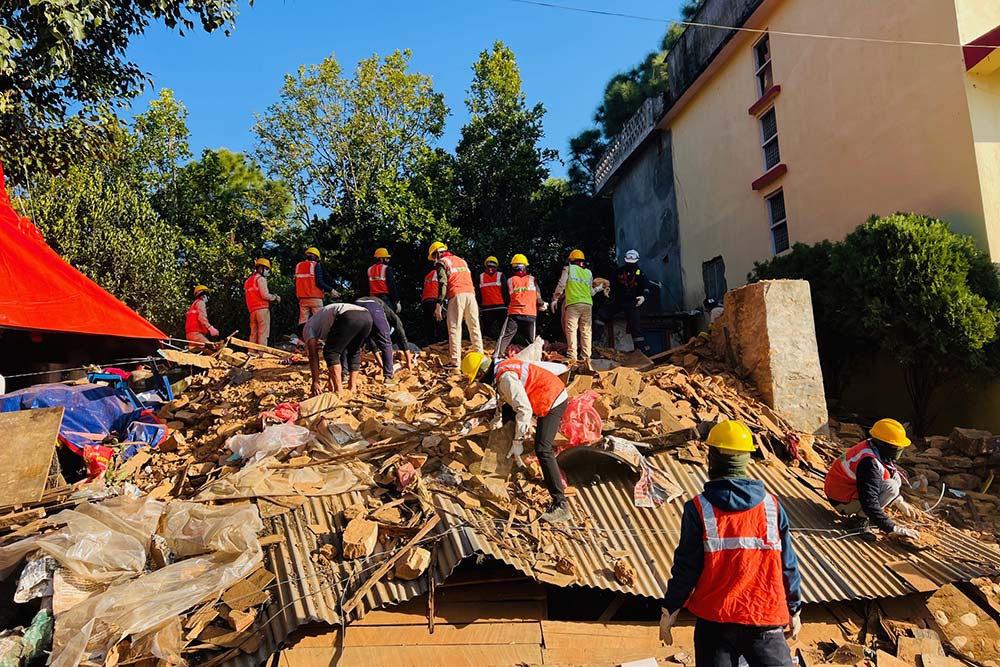
The tourism Industry is undoubtedly an important economic sector for Nepal. According to Deepak Raj Joshi, CEO of Nepal Tourism Board, tourism industry currently contributes 3.5% to the country’s GDP and is one of the fastest growing sectors of economy in Nepal. Hospitality plays an important part in tourism development.
Many international hotel chains and a growing number of local projects today play a substantial role in the hospitality businesses. Technology driven hospitality services like Airbnb and OYO can be viewed as game changers in the present time. Though Airbnb and OYO are both room/hotel booking websites, they have had a huge impact on how people today choose and stay when travelling.
Airbnb
Airbnb lets people rent out their properties or spare rooms to guests through listing out their properties in Airbnb’s online marketplace; website or mobile app. For this service, Airbnb takes 3% commission for every booking from hosts, and between 6-12% from guests. Since Airbnb is about renting a property, there is no hotel kind of service in real, but it also depends upon the hosts.
Not all properties in Airbnb are the same. It offers different types of stays: living together with host’s family, typical cheap home stays, and luxurious penthouse apartments. Also in terms of check-in, check-out or cancellation policy, there is more flexibility in Airbnb, depending on the host, than with hotels.
Just to get a glimpse into the kind of impact Airbnb is facilitating on the tourism industry in India and China, during an interview with The Economic Times’s Gaurav Laghate earlier this year, Nathan Blecharczyk, Co-Founder and Chief Strategy Officer of Airbnb, underlined how India and China are on the rise to become Airbnb’s key revenue generators in Asia.
 Blecharczyk said, “With over 30,000 listings in the country (India), Airbnb listings in India have grown by 115% over the past year. There have been almost times growth in the number of nights booked on Airbnb in India since 2016.” He also mentioned that Indian guests have travelled to nearly 160 different countries on Airbnb including popular destinations such as France, Italy, the UK and the US and also have seen 2.1 times growth in domestic travel taking place on Airbnb within India.
Blecharczyk said, “With over 30,000 listings in the country (India), Airbnb listings in India have grown by 115% over the past year. There have been almost times growth in the number of nights booked on Airbnb in India since 2016.” He also mentioned that Indian guests have travelled to nearly 160 different countries on Airbnb including popular destinations such as France, Italy, the UK and the US and also have seen 2.1 times growth in domestic travel taking place on Airbnb within India.
In terms of China, Blecharczyk stated that China is Airbnb’s fastest growing domestic market ever, second fastest growing outbound travel market, and expect China to be the top origin market for Airbnb globally by 2020. Sharing some statistics about Airbnb’s China community, he said, “Airbnb has had over 10 million guest arrivals by Chinese travellers since 2008, with over half of those occurring in the past year! We have more than 150,000 active listings in China and domestic listings have grown nearly 100% in the past year.”
Airbnb in Nepal
Airbnb is definitely growing in Nepal, especially in major cities like Kathmandu and Pokhara. “Online businesses like Airbnb are flourishing very well, and foreigners are keen on staying with host families rather than in hotels,” says Manoj Shrestha whose property, Om Apartments in Patan Durbar Square and Jhamsikhel, are listed on Airbnb. He has also earned the ‘Superhost’ badge. Subu Shrestha and Mala Rajbhandari Shrestha of Ananya Apartment in Thamel echo the same sentiment saying that apartments offer privacy and are perfect for family vacations. Today, there are already thousands of Nepali properties listed on Airbnb and the number is just increasing.
Ajay Jain, a Civil Engineer, and Pankaj Bhansali, Owner of Sky Technologies are Airbnb users. “I have used Airbnb in different parts of the world but here it is different. The warmth you receive from the host is a blessing and they try to do their best to make your stay worthwhile,” says Jain.“These things rarely happen in any hotel. Moreover, I usually end up giving a 4 star,” Bhansali shares and adds that staying in someone’s home helps you discover interesting places that are not mentioned in travel guides and a stay in Airbnb is more independent as compared to any traditional hotel. He also mentions that if you want to experience remote areas where hotels may not be available, Airbnb is the go-to app.
But though these businesses are flourishing, Manoj stresses over the lack of an organised body to monitor this business model. Business owners are free to charge rent or cost per night as much or as less as they want. With no legal guidelines or monitoring body, the taxes they pay is irregular.
 How Can You Be an Airbnb Host?
How Can You Be an Airbnb Host?
According to Manoj, the basic criteria to become an Airbnb host is to have a spare place,a room or a whole apartment, have a positive attitude towards the guests and a will to show hospitality. “The property you are renting should be clean and comfortable with basic amenities that a person needs while s/he is travelling.”As for the payment system, he stated it is not mandatory to have an international bank account for transactions.
When asked about the contractual agreements, Manoj states that it is up to the hosts whether they want to do the agreement with the tenant during the course of renting. However, there are no laws imposed by the government for Airbnb hosts.
To get a legal perspective we talked with ShikharPandit, Managing Associate at Gandhi & Associates. He mentioned that any type of business engaged in the hospitality business should be registered whether it is home-stay or limited number rooms. “Furthermore, the Industrial Enterprise Act also requires any type of hotel businesses to be registered at the DoI. In this case it may well be that they have to be registered as a cottage industry, but nonetheless they have to be registered.”
Airbnb Consequences and Controversies
Though Airbnb is offering wide hospitality services, there are a few reasons due to which people still prefer hotels; a major reason being trust issues. There have been frequent complaints about rooms, properties or localities booked through Airbnb not being the same as described or pictured in the host Airbnb page.
Another reason is that the hosts rent out their property to other people even though booking and payments were made by the guests due to which they have to wait for days to get their refund. Scenarios regarding sexual harassment or property destruction have also occurred questioning the host inspection policies of Airbnb. Along with these problems, hosts engaging in ‘behind the back’ dealing with guests, poor customer follow-up and short term rental administrations/laws also make it confusing for people to not use Airbnb.
Although there are setbacks, Airbnb has still been able to maintain its popularity. Also, to mitigate such occurrences, Airbnb is working to improve inspection policies and has issued insurance policies if and when such matters occur. The home aggregator service provider has also added new features, experiences and restaurants.
 OYO Hotels and Homes
OYO Hotels and Homes
OYO was established in 2013. Ritesh Agarwal, Founder and Group CEO of OYO Hotels and Homes, states that OYO’s genesis lies in creating quality living spaces. He proudly adds, “OYO has emerged as South Asia’s largest and world’s fastest growing chain of leased and franchised hotels, homes and living spaces, and our mission remains the same.”
Though both OYO and Airbnb operate on revenue-sharing model with their asset owners, which in terms of OYO are hotel rooms, Agrawal mentions that OYO offers end-to-end support in terms of technology, operations, transformation, civil renovations and brings these standardised stays to discerning travellers through their omni channel distribution across online and offline channels like OYO App, website and call centre, leading to over 90% of demand.
So, how to be part of OYO’s chain and what are the benefits? “Any hotel that wants to be a part of OYO’s chain has to undergo stringent quality checks and adhere to our prescribed standard,” describes Agarwal. OYO has a 150-point checklist that covers smallest of the details including the thickness of the mattress, lights of a particular lumen etc., size of the television and thread count of linen. After the hotel passes the checklist, they can be part of OYO’s chain.As for the benefits, Agarwal says that OYO ensures high-quality customer experiences and at the same time high yield for asset partners by maintaining 70-80% occupancy.
On legal grounds, Shikhar Pandit says, “If international chains like Radisson, Hyatt and Marriot have to obtain government approval (i.e. approval from the DOI, IRD and NRB), I do not see why OYO would not require the same.”
Since the company launched in Nepal in 2017, OYO has had a robust growth with over 1400 exclusive rooms over 80 franchised and leased hotels in Kathmandu and Pokhara, and ten times increase in number of bookings in their network with rates of hotels starting as low as Rs. 999 per night and averaging Rs. 2,000 per night.
Impact of Airbnb and OYO Hotels and Homes on Traditional Hospitality Business in Nepal
With the rise of rooms and hotel aggregators like Airbnb and OYO Hotels and Homes, there is a definite whiff of change detected in the hospitality business. But how have these companies affected the traditional hospitality businesses.
Anu Parajuli, Asst. Manager – Sales and Marketing at Radisson Hotel Kathmandu, says, “As tourism is flourishing, hotels and lodges in Nepal are escalating, and we can find different categories and various kinds of accommodation nowadays. My perception towards Airbnb and OYO is positive in general.” She then adds, “Radisson being an international chain is well known for the exceptional services and facilities. We attract many international as well as local tourists with our brand and values; therefore, so far we have not been affected by the presence of OYO and Airbnb.”
Though these international companies might not be creating a huge effect currently in the traditional hospitality business now, Parajuli thinks if these brands operate positively and are able to exceed customer expectations, tourists will have the extra option which might affect luxury hotel business. She thinks that tourism related government and operating organisations thus must have a stern registration procedure for international brands like Airbnb and OYO.
Therefore, the criteria set to meet the quality that is determined by these brands should not be comprised by the local operators working in partnership which is why the Ministry of Culture, Tourism and Civil Aviation, Hotel Association of Nepal and Nepal Tourism Board should be aware of the hotel aggregators and create rules accordingly. “License, tax, rules and regulations should be traced and checked time and again to help maintain the business ethics and standards, whereas external audit should be strictly in place to find loopholes, to improvise, and revise policies or terminate rule breakers,” says Parajuli.





